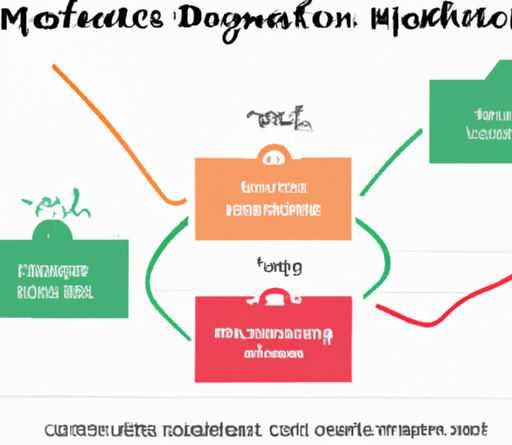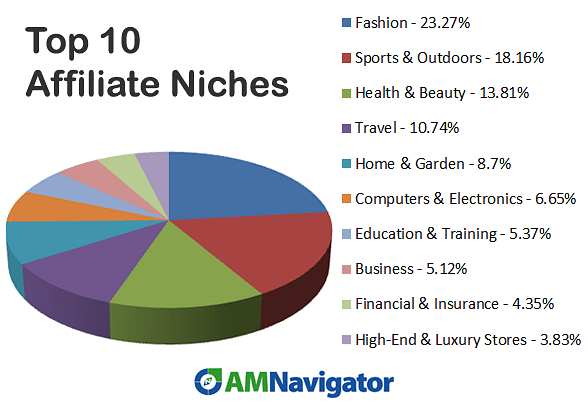
Affiliate marketing has become an increasingly popular way to generate passive income in today’s digital age. By partnering with established businesses, you can promote their products or services and earn a commission for each sale made through your unique affiliate link. In this article, you will explore the power of affiliate marketing niches and how they can fast track your journey to financial freedom. Discover the key considerations when selecting a profitable niche, the benefits of focusing on a specific audience, and valuable tips to maximize your affiliate marketing success. Get ready to unlock the potential of affiliate marketing and embark on a lucrative path towards passive income.
Understanding Affiliate Marketing
What is Affiliate Marketing?
Affiliate marketing is a performance-based marketing strategy where individuals or companies promote products or services through their own platforms or channels. They earn a commission for every sale, lead, or action generated through their unique affiliate link. This type of marketing allows businesses to expand their reach and increase sales through partnerships with affiliates who have access to a target audience.
How does Affiliate Marketing work?
In the world of affiliate marketing, there are three main parties involved: the advertiser (merchant), the affiliate (publisher), and the consumer. The advertiser is the company or individual selling the product or service. The affiliate acts as the middleman, promoting the advertiser’s products or services to their audience. The consumer is the person who clicks on the affiliate’s unique link and performs the desired action, such as making a purchase.
Affiliates typically earn a percentage of the sale, a fixed commission, or a fee for each lead they generate. They can promote products through various channels such as websites, blogs, social media, email marketing, or even offline methods. The success of an affiliate marketer relies on their ability to effectively market products and drive targeted traffic to the advertiser’s website.
Benefits of Affiliate Marketing
Affiliate marketing offers several benefits for both advertisers and affiliates. For advertisers, it provides a cost-effective way to reach a wider audience without incurring upfront marketing costs. Advertisers only pay commissions when a desired action is achieved, making it a low-risk investment. Additionally, affiliate marketing allows advertisers to tap into the expertise, creativity, and influence of affiliates, who can bring in new customers and increase brand visibility.
For affiliates, one of the biggest advantages of affiliate marketing is the potential to earn passive income. Once the initial setup and promotional efforts are in place, affiliates can continue to earn commissions on a regular basis, even when they are not actively promoting the products or services. This passive income stream can provide financial stability and flexibility.
Affiliate marketing also allows affiliates to monetize their existing platforms, whether it’s a blog, social media account, or website. They can leverage their audience and credibility to recommend products that align with their niche and provide value to their followers. This helps to build trust and loyalty with their audience, leading to higher conversion rates and better long-term relationships.
Challenges in Affiliate Marketing
While affiliate marketing offers numerous opportunities, there are also challenges that both advertisers and affiliates may encounter. One of the challenges for advertisers is finding reliable affiliates who can effectively promote their products or services. It’s important to vet potential affiliates and ensure they have a genuine audience and the necessary skills to drive sales.
Affiliates may face challenges in gaining traction and standing out in a competitive market. With so many affiliates promoting similar products or services, it can be difficult to differentiate themselves and capture the attention of their target audience. Building a strong personal brand, offering unique value, and continuously optimizing their marketing efforts can help affiliates overcome these challenges.
Another challenge in affiliate marketing is managing and tracking affiliate activities and commissions. Advertisers need to have a reliable tracking system in place to accurately attribute sales or leads to the appropriate affiliates. They also need to ensure timely payment of commissions to maintain positive relationships with affiliates.
Despite these challenges, a well-executed affiliate marketing strategy can lead to significant financial rewards and long-term partnerships between advertisers and affiliates.
Finding Profitable Niches
Importance of Choosing the Right Niche
Choosing the right niche is crucial for success in affiliate marketing. A niche refers to a specific segment of a market that can be targeted based on specific interests, demographics, or needs. By narrowing down their focus to a specific niche, affiliates can position themselves as experts in that area and tailor their marketing efforts to a highly relevant audience.
When selecting a niche, it’s important to consider factors such as market demand, competition, and profitability. Finding a balance between a niche with high demand and low competition can provide lucrative opportunities for affiliates. Additionally, affiliates should choose a niche that aligns with their own interests, knowledge, and expertise to ensure long-term sustainability and enjoyment in their affiliate marketing journey.
Researching Potential Niches
Researching potential niches is a crucial step in affiliate marketing. Affiliates need to understand the market demand, audience demographics, and competition within a particular niche before diving in. There are several ways to conduct niche research:
-
Keyword research: Using keyword research tools like Google Keyword Planner or SEMrush can help identify popular keywords and search volumes related to a specific niche. This data can provide insights into the level of demand and competition for various niches.
-
Market trends: Keeping abreast of market trends and consumer behavior can help affiliates identify emerging niches or opportunities within existing niches. Monitoring industry reports, news, and social media discussions can provide valuable insights into potential niches.
-
Competitor analysis: Analyzing competitors within a niche can help affiliates understand their strategies, target audience, and potential gaps in the market. By studying successful competitors, affiliates can gain inspiration and ideas for their own marketing campaigns.
-
Audience research: Understanding the needs, preferences, and pain points of a target audience is essential for effective niche selection. Conducting surveys, engaging in social media discussions, or studying online communities can provide valuable insights into audience behavior and their specific needs.
Identifying Profitable Niches
Identifying profitable niches requires a combination of market research, personal interest, and strategic thinking. Here are some key factors to consider when evaluating the profitability of a niche:
-
Market demand: Look for niches that have a consistent and growing demand. Niches related to evergreen topics such as health, wealth, and relationships often offer long-term profitability.
-
Profit potential: Evaluate the profit potential within a niche by analyzing the average commission rates for affiliate programs or the price points of products within that niche. Higher-priced products or recurring subscription models tend to offer more lucrative opportunities.
-
Competition: Analyze the level of competition within a niche to understand if it is oversaturated or if there are gaps that can be exploited. High competition may indicate a popular niche, but it can also make it harder to stand out and capture market share.
-
Trends and seasonality: Consider the trends and seasonality of a niche. Some niches may experience fluctuations in demand based on seasons or trends, so it’s important to assess the long-term stability of a niche.
By carefully evaluating these factors, affiliates can identify niches that offer the best balance of demand, profitability, and long-term sustainability.
Evaluating Competition
Competition analysis is an essential step in determining the viability of a niche and the potential success of affiliate marketing efforts. Here’s how to evaluate competition within a niche:
-
Keyword analysis: Conduct a keyword analysis to identify the competition level for relevant keywords within a niche. Tools like Moz Keyword Explorer or SEMrush can provide insights into keyword difficulty and competition levels.
-
Website analysis: Evaluate the websites and blogs of competitors within the niche. Assess factors such as their domain authority, backlink profiles, content quality, and social media presence. This can provide valuable insights into the level of competition and the strategies employed by successful affiliates.
-
Product analysis: Research the products or services being promoted within the niche. Evaluate factors such as product quality, branding, pricing, and customer reviews. This can help identify gaps in the market or areas where affiliates can differentiate themselves from the competition.
-
Audience engagement: Monitor the engagement levels and audience feedback for competitors’ content or promotions. This can provide insights into the level of customer satisfaction, the effectiveness of marketing strategies, and potential opportunities for improvement.
By thoroughly evaluating the competition within a niche, affiliates can gain a clear understanding of the challenges they may face and develop strategies to differentiate themselves and stand out in the market.
Health and Wellness
Introduction to Health and Wellness Affiliate Marketing
Health and wellness affiliate marketing is a thriving niche that encompasses various products and services related to physical and mental well-being. This niche includes products such as dietary supplements, fitness equipment, organic foods, mindfulness apps, and personal care items. The health and wellness industry has experienced significant growth in recent years, driven by increasing consumer awareness and interest in leading a healthy lifestyle.
Popular Health and Wellness Niches
Within the health and wellness niche, there are several popular sub-niches that affiliates can explore. These include:
-
Weight loss: This sub-niche focuses on products and programs that help individuals achieve their weight loss goals, such as weight loss supplements, meal replacement shakes, and exercise programs.
-
Fitness equipment: Affiliates can promote a range of fitness equipment, from home gym machines to yoga mats and resistance bands. This sub-niche caters to individuals looking to improve their fitness levels or set up a home gym.
-
Natural and organic products: The demand for natural and organic products is on the rise, making this a lucrative sub-niche. Affiliates can promote organic skincare, natural supplements, and chemical-free personal care items.
-
Mental health and mindfulness: As mental health and mindfulness gain more attention, affiliates can promote meditation apps, therapeutic tools, self-help books, and mental wellness programs within this sub-niche.
Key Players and Affiliate Programs in the Health and Wellness Industry
The health and wellness industry is home to numerous key players and affiliate programs that offer opportunities for affiliates to earn passive income. Here are some notable players and programs in the industry:
-
Amazon Associates: Amazon Associates is a widely recognized affiliate program that offers a vast selection of health and wellness products. Affiliates can earn commissions on a wide range of products, including supplements, fitness equipment, and personal care items.
-
iHerb: iHerb is an online retailer specializing in natural health and wellness products. They offer a comprehensive affiliate program that provides affiliates with a wide selection of products to promote and earn commissions on.
-
ClickBank: ClickBank is a popular affiliate marketplace that offers a range of health and wellness products, including fitness programs, weight loss supplements, and natural remedies. Affiliates can earn generous commissions on each sale made through their affiliate links.
-
HealthTrader: HealthTrader is a dedicated health and wellness affiliate network that offers a wide range of products from established brands. Affiliates can access exclusive offers, detailed analytics, and marketing tools to maximize their earnings in the health and wellness niche.
These are just a few examples of key players and affiliate programs in the health and wellness industry. Affiliates can explore these programs and others to find the most suitable opportunities that align with their niche and target audience.
By understanding the fundamentals of affiliate marketing, the importance of choosing the right niche, and exploring specific niches such as health and wellness, affiliates can set themselves up for success in their pursuit of passive income. With proper research, strategic marketing efforts, and persistence, affiliate marketers can build a profitable online business that generates consistent income and long-term financial stability.







